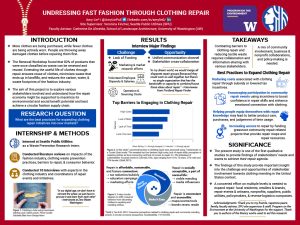Undressing Fast Fashion Through Clothing Repair
The capitalistic fashion industry is designed to encourage the overproduction and overconsumption of garments. According to the Waste & Resources Action Programme, extending the useful life of clothes has been identified in the life cycle assessment as one of the most impactful ways to reduce the environmental and social footprint of the fashion industry. The aim of this study was to uncover the best practices that can expand clothing repair initiatives into new markets. To accomplish this task, I interned with the Seattle Public Utilities (SPU) and conducted online research on clothing waste prevention programs, policies, and measurement systems at the local, national, and international levels. With the help of SPU’s network base, I held interviews with experts involved in clothing waste prevention and identified key themes in their responses. Findings from literature review show that socioeconomic, systemic, and psychological barriers are potential barriers to individuals repairing clothes. Additionally, interview responses reveal that having funding, internal and external support, and a unified communication around repair can help repair projects and businesses in the United States increase their repair and waste prevention efforts. The paper proposes ways to help individuals overcome the barriers to repair and ways to rethink and redesign the supply chain in the clothing industry. The paper is important because it evaluates the roles of relevant stakeholders that can best engage with the repair economy and ultimately reduce the impact of the fashion industry.
